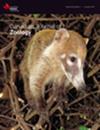Population growth rates of pronghorn: influence of temporally and spatially explicit conditions, density dependence, and scale
IF 1
4区 生物学
Q3 ZOOLOGY
引用次数: 0
Abstract
Density-independent and density-dependent population regulation has long been a subject of investigation. We examined density-dependent and density-independent factors on growth rates of pronghorn (Antilocapra americana (Ord, 1815)) using a retrospective analysis of population survey data. Across Idaho, we found as the proportion of the subpopulation harvested the previous year increased, growth rates increased. Similarly, as fawn recruitment increased, growth rates increased. We also found when the growth rate in the previous year increased, the growth rate the subsequent year decreased. When subpopulations were examined independently, we found in a low-elevation desert subpopulation, growth rates were influenced by growth the previous year. In an agricultural-dominated site, growth rates were influenced by fawn recruitment in the current year and maximum temperature the previous fall. Growth rates in a mid-elevation shrub-steppe site were influenced by drought severity prior to parturition and the growth rates from the previous year. Growth rates in two mountain valley subpopulations were influenced by measures of vegetative greenness. At the statewide scale, while managers may strive for increased numbers of pronghorn, density dependence will limit the ability for a region-wide numerical response. On the localized scale, drivers of growth were temporally and spatially-explicit, and biologists must consider site-specific actions.叉角羚种群增长率:时空显性条件、密度依赖性和尺度的影响
密度独立和密度依赖的人口调控一直是人们研究的课题。通过对人口调查数据的回顾性分析,研究了叉角羚(Antilocapra americana, Ord, 1815)生长速率的密度依赖因子和密度非依赖因子。在整个爱达荷州,我们发现随着前一年收获的亚种群比例的增加,增长率也在增加。同样,随着小鹿招募的增加,增长率也随之提高。我们还发现,当前一年的增长率增加时,后一年的增长率就会下降。当对亚种群进行独立检测时,我们发现在低海拔沙漠亚种群中,生长速率受前一年生长的影响。在一个以农业为主的地点,生长速度受到当年小鹿招募和前一年秋天最高温度的影响。中高海拔灌丛草原的生长速率受分娩前干旱严重程度和前一年生长速率的影响。两个山谷亚居群的生长速率受植被绿度的影响。在全州范围内,虽然管理人员可能会努力增加叉角羚的数量,但密度依赖将限制区域范围内数值响应的能力。在局部尺度上,生长的驱动因素在时间和空间上是明确的,生物学家必须考虑特定地点的行动。
本文章由计算机程序翻译,如有差异,请以英文原文为准。
求助全文
约1分钟内获得全文
求助全文
来源期刊

Canadian Journal of Zoology
生物-动物学
CiteScore
2.40
自引率
0.00%
发文量
82
审稿时长
3 months
期刊介绍:
Published since 1929, the Canadian Journal of Zoology is a monthly journal that reports on primary research contributed by respected international scientists in the broad field of zoology, including behaviour, biochemistry and physiology, developmental biology, ecology, genetics, morphology and ultrastructure, parasitology and pathology, and systematics and evolution. It also invites experts to submit review articles on topics of current interest.
 求助内容:
求助内容: 应助结果提醒方式:
应助结果提醒方式:


